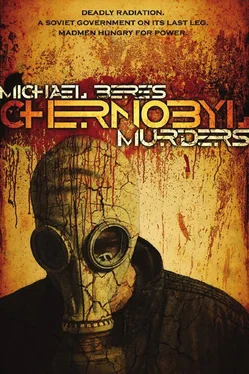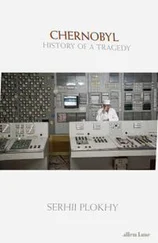Michael Beres - Chernobyl Murders
Здесь есть возможность читать онлайн «Michael Beres - Chernobyl Murders» весь текст электронной книги совершенно бесплатно (целиком полную версию без сокращений). В некоторых случаях можно слушать аудио, скачать через торрент в формате fb2 и присутствует краткое содержание. Жанр: Триллер, на английском языке. Описание произведения, (предисловие) а так же отзывы посетителей доступны на портале библиотеки ЛибКат.
- Название:Chernobyl Murders
- Автор:
- Жанр:
- Год:неизвестен
- ISBN:нет данных
- Рейтинг книги:4 / 5. Голосов: 1
-
Избранное:Добавить в избранное
- Отзывы:
-
Ваша оценка:
- 80
- 1
- 2
- 3
- 4
- 5
Chernobyl Murders: краткое содержание, описание и аннотация
Предлагаем к чтению аннотацию, описание, краткое содержание или предисловие (зависит от того, что написал сам автор книги «Chernobyl Murders»). Если вы не нашли необходимую информацию о книге — напишите в комментариях, мы постараемся отыскать её.
Chernobyl Murders — читать онлайн бесплатно полную книгу (весь текст) целиком
Ниже представлен текст книги, разбитый по страницам. Система сохранения места последней прочитанной страницы, позволяет с удобством читать онлайн бесплатно книгу «Chernobyl Murders», без необходимости каждый раз заново искать на чём Вы остановились. Поставьте закладку, и сможете в любой момент перейти на страницу, на которой закончили чтение.
Интервал:
Закладка:
Three suspects with the blood of Gypsies running through their veins. Three Gypsies whose photographs, especially the Horvath brothers, reminded him of photographs of Bela Bartok, the so-called composer who collected simpleminded folk tunes and pawned them off as art, the so-called composer who went to America to die with his old-fashioned music.
Komarov took a sip of vodka and again felt the weight of the knife against his chest. He reached into his inside pocket and held the knife. If only he had owned the knife earlier in his career and used it. Perhaps on Barbara, the dark-haired Gypsy who humiliated him. If only he had started his climb on the ladder sooner, perhaps in the army before joining the KGB. If only he had been old enough to use the knife to avenge the death of his father, a lover of music, especially Prokofiev.
Komarov gripped the knife tightly and thought again about the night he met the man who would kill his parents. It was some years after the end of the Great Patriotic War. Komarov paused to drink to the victory of the Great War, then regripped his knife and thought back.
It was in Moscow during the time of rebuilding. Although he was only a few years old, the scene was vivid. He and his father had left his mother in the one-room apartment and gone to the opera house to see Love for Three Oranges. His father loved Prokofiev’s music. “The music of the future,” his father said. “Did you know Prokofiev traveled to America, dear Grigor? Of course, Americans did not understand his music. Prokofiev’s music of the future belongs here in the motherland.” Unfortunately the motherland’s future was something his father would never see, because after the opera, the Gypsy landlord killed his parents. In the street outside the apartment building, the landlord, his sinister foul face hidden in the shadow of a brimmed hat, argued with his father about the rent, equated the rent with the cost of opera tickets.
A week later, they were forced to move in with Uncle Ivan in the village north of Moscow. A month later, his father put Uncle Ivan’s pistol to his head in the barn. A year later, his mother died of pneumonia in the cold corner of Uncle Ivan’s farmhouse, and little Grigor was sent to the orphanage, making the army barracks, years later, seem luxurious.
In the army Komarov learned the old Russian saying and reversed it. Where he should have licked, he did lick; where he should have barked, he did bark. He kept his opinions to himself, praising officials even when he thought they were fools, as when Khrushchev knuckled under to Kennedy during the Cuban missile fiasco. The army gave Komarov comfort and discipline. The army gave him the chance his father never had. While gripping the knife tightly, he wished he’d had its power the night of the opera.
As a boy he would have wanted to be a Brezhnev rather than a Gorbachev, not allowing himself to be duped the way the current administration allowed themselves to be duped. But perhaps, like all things in this modern world, the current situation was a charade, the talk of perestroika a ruse by Gorbachev to lure the movie actor Reagan into his clutches.
Komarov had seen much during his years in the KGB. Orthodox Church leaders working for the KGB after being compromised by Romeo agents. Spy planes collecting air samples routinely doctored by those being spied on. A Brezhnev rather than a Gorbachev.
How could he possibly accomplish it today? Perhaps Gypsies were the answer. Gypsies, after all, were much like the Muslims in Afghanistan-male-centered, out of touch with modern culture, using superstitious religion to undo the world. Gypsies allowed their children to smoke. He’d seen them in the slums of Moscow, eight-and nine-year-old boys smoking. Not girls. Boys. The boys in the culture growing up to overthrow governments. The boys of deviant societies bent on destruction while he went into the army and then into the KGB to serve Mother Russia.
Muslims and Gypsies. He’d known of a Hungarian CIA station chief code named Gypsy Moth. Perhaps the code name could be used again. Perhaps the cousin visiting the Horvath brothers had objectives beyond a familial visit. Western secret services actively recruited spies and provocateurs. Perhaps uncovering a network of spies and provocateurs was the key, someone hired by American intelligence to compromise a Chernobyl engineer.
“A Brezhnev rather than a Gorbachev,” he mumbled.
Komarov was not certain how long he had been on the porch, perhaps an hour, perhaps two. But he did know he had refilled his glass several times. He was now in the most comfortable state of his day, a euphoric state in which the cares of the past and present fade and the vodka has not yet completely taken over. It was difficult to maintain this feeling for long. But while it lasted, each evening, he felt it would last forever. Unfortunately, the bottle required one to become drunk and uncomfortable in order to pass through this state. He thought about this for a moment, tried to analyze the logic of it, then took another drink.
A noise in the bushes to his left. Komarov sat forward, put down his glass. A figure moved swiftly along the side, then the front of the porch. Komarov took the knife from his pocket. For an instant he thought of Chkalov, of militia vengeance. He recalled one of his agents, Allika, who had been mysteriously killed last year. He was out of his chair and had begun to open the knife when he recognized his son coming up the stairs.
“Dmitry!”
“What’s new, Pop?”
He slipped the knife back into his pocket, allowing it to close within its handle. “You frightened me.”
“What else is new?”
“Why don’t you use the front door?”
“Why do you sit out here every night?”
“Why do you always ask questions in response to mine?”
“Why do you always ask questions?”
It was no use. Komarov sat back in his chair, took a drink of vodka, lit a cigarette.
Instead of going into the house, Dmitry sat on the steps facing the yard. Komarov stared at the dark outline of his son. So thin he seemed unhealthy. His hair, cropped on the sides and long on top, sticking straight up. His damnable earring catching the light from the house.
“I got a job today,” said Dmitry.
“A job?” No. He must not sound overly excited. “What kind of job?”
“At the art museum in Kiev.”
“Which one? There are several art museums.”
“Not the Museum of Russian Art. This one’s a few doors away.”
“What matters is you’re employed, Dmitry.”
“So now you don’t have to say your son was kicked out of the university and he’s a parasite. Am I right? Is this why you’re so impressed?”
“No,” said Komarov. “I’m interested. Which museum is it?”
“Oriental and Western Art. I’ll work in the gift shop. Fyodor got me the job.”
Fyodor, the one Dmitry brought to dinner last month, the one who put his arm around Dmitry as they walked down the street.
Komarov took another drink, then another. His own son, the son of a major in the KGB, a homosexual. And now his… his what?
Mate? Bed partner? Lover? And now his son’s lover had gotten Dmitry a job.
“So, what do you think, Pop?”
“I think it’s good to have a job.” Komarov wanted to be alone with his vodka but knew he must go on, he must try despite the fact he had left the state of euphoria and was descending into the depths of drunkenness. “I also think relationships should be with the right people.”
“Like who?”
The wind blew across Komarov’s face, but he could not smell the air. All he could smell was the vodka.
“A long time ago,” said Komarov, “when I was stationed in East Berlin, there was a woman named Gretchen. Golden blond hair, eyes like fine crystal, skin soft and fair…”
Читать дальшеИнтервал:
Закладка:
Похожие книги на «Chernobyl Murders»
Представляем Вашему вниманию похожие книги на «Chernobyl Murders» списком для выбора. Мы отобрали схожую по названию и смыслу литературу в надежде предоставить читателям больше вариантов отыскать новые, интересные, ещё непрочитанные произведения.
Обсуждение, отзывы о книге «Chernobyl Murders» и просто собственные мнения читателей. Оставьте ваши комментарии, напишите, что Вы думаете о произведении, его смысле или главных героях. Укажите что конкретно понравилось, а что нет, и почему Вы так считаете.












